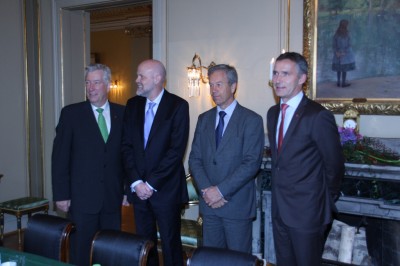Norwegian Finance Minister Sigbjørn Johnsen says it’s more important than ever that EU leaders carry out the measures they’ve approved as they grapple with the ever-deepening crisis around Greek debt. Top EU officials have claimed they won’t disburse any more funds to Greece until the crisis package they thought was agreed last week is in place.

The drama of the past two days, after Greek Prime Minister George Papandreou suddenly demanded a referendum to approve the crisis package, “just shows how difficult this is,” Johnsen told Norwegian Broadcasting (NRK) on Thursday.
“Economic policies are supposed to boost security around the economy,” Johnsen said. “Now the uncertainty is greater. That’s not good.”
He was relieved the EU officials, led by German Chancellor Angela Merkel and French President Nicolas Sarkozy, have now said that no additional EU money should be sent to Greece until the country has actually accepted the EU’s crisis package terms. They thought that had been done, until Papandreou indicated the package would only go though if Greek voters approved it. That means several more weeks of delays, during which Greece’s ability to pay its bills is unclear and its future in the euro zone becomes more unclear.
“Merkel and Sarkozy have said they will carry out what they’ve said they’ll do,” Johnsen told NRK. “Now it means setting up an even stronger firewall around Greece to keep the unrest from spreading to other countries.”
Norway’s economy has remained strong but already is showing many signs of being affected by the debt crisis in Europe. The Oslo Stock Exchange has fallen, the price of oil is down, salmon prices have taken a dive, demand for other Norwegian exports is declining and Norwegian industrial output is under pressure, also because of the strength of the Norwegian currency against the euro, the British pound and the US dollar.
On Wednesday, metals firm Elkem announced it was halting production at its Elkem Salten smelting operation from November 15, for at least two months. Elkem officials cited weakened industrial activity and uncertainty in Europe, which has hurt markets for Elkem Salten’s products that include silisium and ferrosilisium for the European chemical and metals industries. The plant is located in Sørfold in Nordland, and layoffs loom.
Johnsen said his ministry was prepared to offer new economic packages locally if needed, but wouldn’t detail what they might include. Norwegian industrial groups are in what they call a “state of high alert” as they closely watch events in Europe unfold.
“It’s important to realize that the unease in Europe can hit us,” Johnsen said. “If it goes from bad to worse, it will be more difficult for Norwegian companies to compete.”
Views and News from Norway/Nina Berglund
Please support our stories by clicking on the “Donate” button now:

